
Interview with David Coulthard
Atlas F1 GP Editor
After ten years at the top David Coulthard is out of a job, and while the future doesn't look too rosy he is not giving up hope of staying in the sport. Atlas F1's David Cameron talks to the Scot about his motivation, his record, and his prospects for next year
So what does the man himself think of his chances of being on the grid in Melbourne next March? "Well I'd like to think better than fifty percent," the Scotsman stated in Hungary, while leaning back and signing photographs for the team as he spoke, "but I can't honestly know until I get my signature on a contract. It's an all or nothing type of situation, isn't it? If you have a signature then you're in, if you don't, then it really depends on - in terms of experience and knowledge and all that sort of thing - [whether] I've got all the potential to be there.
"I don't presently have a contract signed, so if I did I'd say one hundred percent, but I can't, because I haven't. But I have to believe I have an opportunity - in some cases, with some of the teams I've spoken to, they went ‘hmm, why are you talking to us?' as if to say ‘why on earth would you want to drive for us?' type thing, so I think in many ways because you've been driving for top teams sometimes they think it's not worth your while to talk to them, which is absolutely ridiculous. The bottom line is I could choose not to want to continue, but I'm going to sit down in November and decide what I want to do thereafter.
"Now, am I going to want to race? Almost certainly, because I enjoy racing, but if I say no, I don't want to race, then what am I going to do? Go and start meddling in the running of the hotels, or go and start meddling in something else, start another business? I'm sure I'm not going to sit at home, counting my pennies - I'm going to have to do something, because that's who I am. And therefore if I can do what I enjoy doing, which I've been doing for twenty two years, can continue to be involved and to influence, to make a difference and work towards getting results, then that seem to me to be a pretty good reason to want to continue. I've never had the ‘do I want to do this?' type of attitude.
"Money was never the motivation - I felt quite comfortable when I was nineteen years old and had nothing in the bank, and felt quite comfortable before I was just starting in Formula One, with a small amount of money. I sit here at thirty three, and in an every day life sense of things I'm a wealthy individual, but it doesn't mean I sleep better at night because that was never my motivation - it's not about having the gold watch down the pub, giving it ‘didn't I do well?'; I've always been quite a private person, I come from a small village, and I still keep myself pretty much to myself."
"Well, no one would have thought that we would have performed so badly at the start of this year," Coulthard notes, "and the fact is that even when you've got all the resources and all the technical people and what have you, you can still get it very wrong. What the team has shown is that the resources allow you to bounce back mid season, or in the latter part of the season, while another team would be condemned to that type of performance all year long.
"Of course your motivation is to win and whatever, but motivation is essentially about believing you can make a difference, believing you can get in there and mix it with whoever you are being competitive with at that time, and enjoying it. Just because I'm not to be in a car that's guaranteed to win doesn't mean I'm going to go off and do something else - that's ridiculous; throughout your career you don't always get that situation.
"Some people have asked if I'm hungry enough or whatever, but what changes? What am I supposed to have changed, just because I have X amount of millions more than I had a few years ago or whatever? Why does that change anything? I've been doing the same thing for 22 years now, and that is racing. I like racing - I admit I don't like some of the things that go on around it, but that gives you something to complain about - and we all need something to whinge about! I always felt that I could compete at the highest level of the sport, which is Formula One, and I still believe I can - that's what motivates me."
DC: How important is it for you to stay in Formula One?
Coulthard: "Right now I genuinely have no commitments in my diary other than racing and testing - that is the truth, not that it's a major revelation, but that is a fact. So what it shows is when people say he's thirty three, he's earnt a lot of money, he's involved in hotels, all the things that people would say, then yes, I have done all those things, but the other guys who've earnt money don't just have it in a shoebox under the bed - they have it in other investments that either are high profile or they're not. The only thing I've done with one particular investment is use my profile to help promote that particular hotel - I live around the corner, so it's not a big effort for me to do.
"Other guys, quite successfully, have wives and children and that's fantastic - I have a brother with three kids, and it's great to see that - but it's a responsibility. I recently invited my brother to the Moto GP, and his first answer was not 'yeah I'll be there', his first answer was 'let me check; the kids are still on holiday'. It is a responsibility, and I just want to demonstrate, you know, am I hungry? Yes. Am I motivated? Yes. Is there something there that's going to make me lift off? No, there is nothing there."
Motivation is one thing, but opportunity is entirely another. With a tenth year at McLaren all but impossible outside of the unlikely scenario of the team being able to race three cars, should Coulthard race next year, motivation will have to be provided in an entirely new manner.
DC: You've been in a mostly top of the grid team for your entire career, you're used to being in a position where you can challenge for wins and Championships, and that motivation I can understand. What do you think is the motivation for a driver who perhaps is used to that and then has to look for something else?
Coulthard: "I guess the ultimate goal for drivers is wins and championships – but even if you don't have a realistic chance, the motivation still comes to do the best job you can, with the tools that you have, and that is what Kimi [Raikkonen] and I have tried to do this year. We have done as well as we could with the tools that we were given, and chose, for the weekend. So just because you're not in a position to win doesn't mean you throw your dummy in the dust and go home saying 'I don't want to play anymore' - it's a fantastic technical challenge, and you get to work with motivated people who can, with your influence, change things.
"You know, I've seen so much that I didn't realise at the time - if you just spend a little bit longer, sit around talking a bit longer, suddenly you say something that seems crazy and the engineers say ‘yeah, I think we can do that', they'll go away and design something or do something with the software and come back with something that might not win that race or the next one, but it just makes the job a little bit easier. It becomes one of those things where you say ‘how did we ever survive without that?'
"In many ways you come up with the same sort of frustrations, the same sort of problems to get the finished product, but you still come, you still do it, because you don't have to be in Formula One - you could be doing it in whatever [field] you want to do, but potentially it's the same motivation: you come here, you've got an interest, you do your homework, you gather information and you come up with a story."
DC: So the target changes, the motivation to be with a team at, say, Jaguar's level becomes to see if you could potentially propel the team up?
Coulthard: "Yeah, sure, of course that is the motivation - you would go in there, and they would look to me for a lot of the experience that I've had, and you get on and work together. And hopefully if those guys are motivated, the attitude would be 'right, we think can do that, and somehow we're going to do that - we're going to find the budget because we believe it's going to bring performance'. It's not a case of coming up with things, it's not about putting leather trimming in the interior of the car because it looks good, because all of those things are of no interest - it's about does it make the car more reliable? Does it make the car easier to drive? All of this will make the car ultimately quicker.
"And so you would come from that point of view first, and then you start getting into 'will it make the car quicker in pure lap times' - that is, the golden set up change or the golden thing that you come up with, and they are few and far between that you come up with something that you bolt on that makes the car two tenths quicker. But maybe if you make the driver a little bit more comfortable, then he can find a tenth or two tenths, and you haven't had to spend a lot of money on it.
"Bear in mind that the regulations are changing significantly, which doesn't immediately mean it's going to turn the grid on its head but, for example, if McLaren could be as far away this year with all the resources then there's absolutely no reason why what has not been regarded as a classically big team couldn't do a good job. I've got a lot of experience, work with motivated people, and sometimes you can do a lot with less finances and all the rest of it - you've just got to be leaner and more focused.
"You know, a football player might make a move that might not seem like a step forward, but if it gives him the ability to derive pleasure from what he's doing then you go for it - you shouldn't automatically stop because you can't win. It's not like boxing, where obviously you should stop before you get beaten - after all, in F1 you get beaten more often than you win!"
DC: How much do you think a driver nowadays can take to another team when they move?
Coulthard: "The basics, still - if you have information, and it depends on the team, but if you have information on geometries and switch positions, aero figures, horsepower figures, things like that, it gives marks in the sand so people know what they're aiming for. That doesn't design their car for them, which is the problem, so the influence … well, maybe you can stop them trying something that you tried somewhere else that didn't actually end up working. So there is that experience, but otherwise it's not as though you're taking a blueprint of a winning car with you."
An obvious point of reference for Coulthard's situation is his good friend Jacques Villeneuve, who found himself without a drive for 2004, before being picked up for the final three races of the season by Renault. The difference, of course, is that Villeneuve maintained he wouldn't return to the sport unless he was able to land a competitive drive, whereas Coulthard, more realistically, is talking to anyone and everyone. Has Coulthard perhaps learnt anything from his friend's plight? Does he see any similarities between their relative situations?
"Well I can't talk for Jacques - he's a very different individual, and he's turned on by different things. He's a gadgets freak and likes to spend hours and hours playing computer games and what have you, so we're wired differently.
"But essentially in the car we do the same job - he's obviously got a World Championship against his name, but that doesn't necessarily mean that he's a better driver than I am, or that I'm a worse driver because I didn't win a world title. If we're going into statistics, I stack up pretty well against a lot of World Champions in terms of my results. I've done more than enough with race wins and wheel to wheel racing - I just didn't manage to do when McLaren were hot, or my teammates were hot at the same time."
Coulthard: "I never really paid too much attention until basically this year, when it was like 'here's my calling card, these are my results'. I suddenly decided that it would be a nice thing to have in the office in Monaco, to stick up pictures of the podiums and victories - on one wall there are the victories, and there are thirteen of those; and on the other wall there are whatever, forty seven podiums. It's quite impressive when you see them all on the wall - it's a good reminder when people come in and say ‘what are all these pictures?' and you go ‘they are my podiums and wins'.
"You don't end up there by accident, even if you are in a good car. So yeah, my record means something, of course it does. It represents my efforts for the last ten years, and there are times when I've let the team down and times when the team's let me down, so the record should be better.
"Take Michael away, who I'm racing - and I think it's a good thing to race at the time of the most successful racer in Formula One, because at some point when you're sitting back and saying 'what did you achieve?' Okay, I've finished second in a World Championship, but the most successful driver in the history of the sport was the guy in front of me. Take Michael out of it and you're in a situation where, all these other guys who won a Championship with one or two victories in a year, a [Keke] Rosberg just for example, they've got no reason to be able to walk any taller than I do. But the reality is people do go ‘yeah, he was a Champion' and if you're not then it's ‘yeah, wanker'.
"But again, my motivation is not public recognition or media recognition - I like, as I do in my life generally, if you can have several polite conversations with people and be friendly, then that's the nicest route to live your life; that's part of my upbringing. At various points I have walked in harmony with the media or I've come up against them because I felt they were being too harsh or whatever, but that's not what makes me feel that I'm a good man or a bad man, or a successful driver or a bad driver."
DC: Ron Dennis has already said how much he values your input into the team - do you have an agreement to stay with the team if no racing opportunities arise?
Coulthard: "I haven't discussed it with Ron, because I've made it quite clear that my intention is to try and get a race seat, so if you've got a very firm and clear goal that you want to achieve then it's a cop out to try and have a safety net there - you don't have a safety net when you are driving a racing car. I've heard some comments that if I don't find anything then maybe there's a possibility; time will tell, if I don't get anything else, whether that's correct or whether it's a motivational word.
DC: What do you think you will do when you stop?
Coulthard: "Something business oriented that I can throw myself into, I'm sure. I'm not spending much time thinking about it at the moment, but it will be something that gets you out of bed in the morning, that creates frustration, that creates problems that you find solutions for, that you sit down at the end of the day and say 'that was good, we made some progress there', or 'this is more difficult than I thought it was, how are we going to get ourselves out of this?' Those are exactly the sort of things that motor racing throws at you.
"Look, I'm closer to the end [of my career] than the beginning, that's for sure, and so I'm working through what I enjoy doing - if playing computer games all day like Jacques was what I enjoyed doing, then I'd be doing it, and I don't have to be here anymore today than when I first started - it was my choice to first start. I'm not clawing desperately to stay here, but it's a perfectly pleasant place to spend your weekends."
DC: It could be worse...
Coulthard: "Sure, it could be worse - I could be sitting, fishing and talking to myself!"
Fourteen of the top fifteen drivers in the World Championship have contracts with Formula One teams for the 2005 season. The one who doesn't have a contract has scored thirteen wins and sixty podium appearances in his ten years in the sport and is currently seven points away from being the fourth highest point scorer in Formula One history. That driver is David Coulthard.
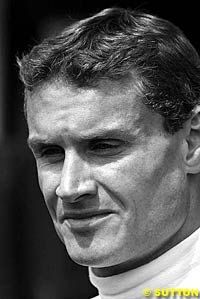 It's an anomaly that doesn't seem to make a lot of sense, but then again this is Formula One, and sometimes sense is what happens elsewhere. With one race to go this season, there remains only one potential top line seat available - probably at Williams, given the outcome of the Contracts Recognition Board's decision regarding Jenson Button - and after that there is the confusion of what remains of the Cosworth-powered teams. Given this, the outlook is less than ideal.
It's an anomaly that doesn't seem to make a lot of sense, but then again this is Formula One, and sometimes sense is what happens elsewhere. With one race to go this season, there remains only one potential top line seat available - probably at Williams, given the outcome of the Contracts Recognition Board's decision regarding Jenson Button - and after that there is the confusion of what remains of the Cosworth-powered teams. Given this, the outlook is less than ideal.
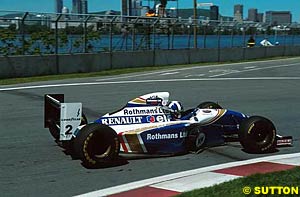 It's easy to see Coulthard as part of the furniture - he has been such a regular part of the upper echelon of the sport since making his debut in 1994, that it is just assumed that you will see that familiar square jaw, hear that well-known soft Scottish burr on any given race weekend. It's also been assumed by a lot of fans that, since he has been with top teams throughout his career, he has had everything handed to him on a plate. To that extent, this year - his first since 1996 where he hasn't been able to claim a win - has been a surprise to fans and the team alike.
It's easy to see Coulthard as part of the furniture - he has been such a regular part of the upper echelon of the sport since making his debut in 1994, that it is just assumed that you will see that familiar square jaw, hear that well-known soft Scottish burr on any given race weekend. It's also been assumed by a lot of fans that, since he has been with top teams throughout his career, he has had everything handed to him on a plate. To that extent, this year - his first since 1996 where he hasn't been able to claim a win - has been a surprise to fans and the team alike.
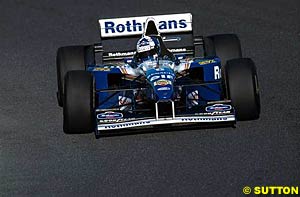 "But what I'm trying to demonstrate is that there's no difference between the David Coulthard of today and the David Coulthard of 1995 other than my wealth - the commitments that I have off track are no more and no less - they're the same. If I had a wife and children I'd feel different, because that is a commitment, a responsibility, but I have no other commitment - I'm planning to go home on Sunday night, but if I choose not to, and never go home again, there's no one who is going to starve to death! I don't have any mental baggage to stop me making any decision I want on Sunday that could change the direction of my life.
"But what I'm trying to demonstrate is that there's no difference between the David Coulthard of today and the David Coulthard of 1995 other than my wealth - the commitments that I have off track are no more and no less - they're the same. If I had a wife and children I'd feel different, because that is a commitment, a responsibility, but I have no other commitment - I'm planning to go home on Sunday night, but if I choose not to, and never go home again, there's no one who is going to starve to death! I don't have any mental baggage to stop me making any decision I want on Sunday that could change the direction of my life.
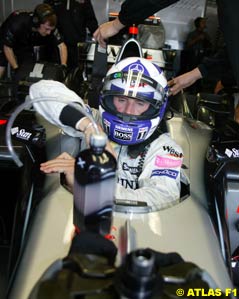 "I really enjoy that aspect of it, and I can imagine the frustration of, if I put myself in your shoes, coming here and you largely have the same scenario, the same song coming from all the teams - we're making progress, we're making this - and you've really got to fish, you've got to sort out what is the little bit of truth amongst everything, and to come up with something in your article where you can say 'yeah, I'm proud of that'.
"I really enjoy that aspect of it, and I can imagine the frustration of, if I put myself in your shoes, coming here and you largely have the same scenario, the same song coming from all the teams - we're making progress, we're making this - and you've really got to fish, you've got to sort out what is the little bit of truth amongst everything, and to come up with something in your article where you can say 'yeah, I'm proud of that'.
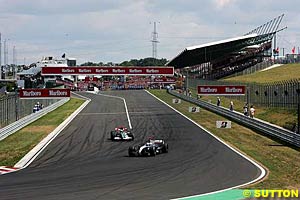 "I've sat twelfth on the grid in Hungary, behind the Jaguar, and my teammate was only one place in front of the Jag - it was only one race, but that's the reality of the situation. Their finishing has been the problem - their performance in qualifying and that kind of thing has been pretty good considering the budget and everything they have - they have a fraction of the budget we have.
"I've sat twelfth on the grid in Hungary, behind the Jaguar, and my teammate was only one place in front of the Jag - it was only one race, but that's the reality of the situation. Their finishing has been the problem - their performance in qualifying and that kind of thing has been pretty good considering the budget and everything they have - they have a fraction of the budget we have.
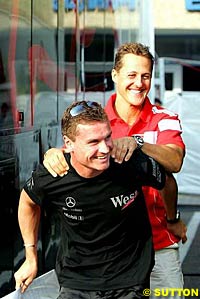 DC: Michael Schumacher always says that records mean nothing to him, although it seems clear that they do - how much does your record mean to you?
DC: Michael Schumacher always says that records mean nothing to him, although it seems clear that they do - how much does your record mean to you?
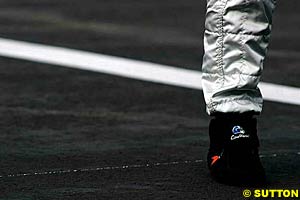 "I just want to get the most competitive seat that I possibly can to allow me the opportunity to continue Grand Prix racing. I enjoy Grand Prix racing - why stop because I've had an opportunity to be with a top four team, just because there isn't the chance to have that? It's a bizarre thing, you know - he's been in a top team so therefore he must stop. Why? I'm only thirty three years old - what am I going do for the next thing? If I didn't enjoy it, or I didn't feel I could contribute, then yeah, it would be time to go off and do something else, whatever that may be. I just don't feel that."
"I just want to get the most competitive seat that I possibly can to allow me the opportunity to continue Grand Prix racing. I enjoy Grand Prix racing - why stop because I've had an opportunity to be with a top four team, just because there isn't the chance to have that? It's a bizarre thing, you know - he's been in a top team so therefore he must stop. Why? I'm only thirty three years old - what am I going do for the next thing? If I didn't enjoy it, or I didn't feel I could contribute, then yeah, it would be time to go off and do something else, whatever that may be. I just don't feel that."
|
Contact the Author Contact the Editor |
Please Contact Us for permission to republish this or any other material from Atlas F1.
|
Volume 10, Issue 42
Atlas F1 Exclusive
Interview with David Coulthard
Interview with Robert Doornbos
2004 Brazilian GP Preview
2004 Brazilian GP Preview
Brazilian GP Facts & Stats
Columns
The F1 Trivia Quiz
Bookworm Critique
On the Road
Elsewhere in Racing
The Weekly Grapevine
> Homepage |